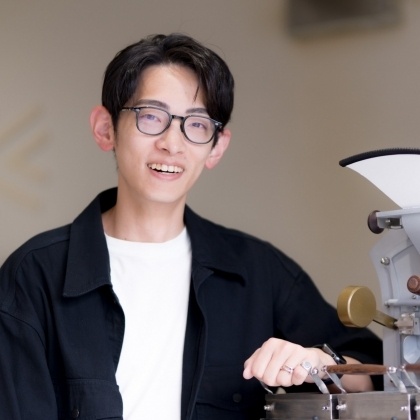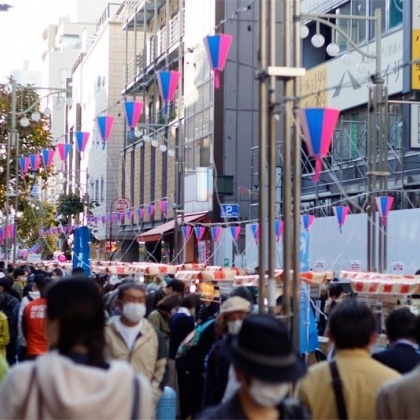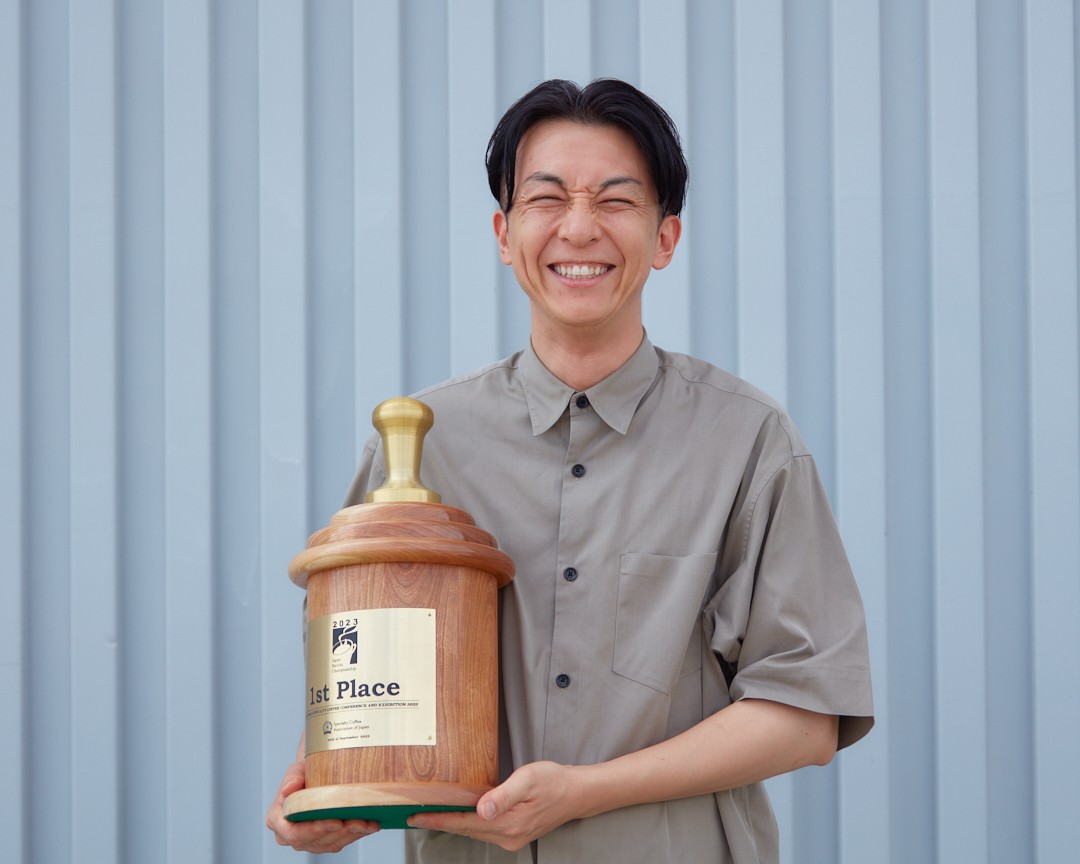
On September 28, 2023, at the final of the Japan Barista Championship (JBC) held at SCAJ2023, Takayuki Ishitani, an advisor to CROWD ROASTER , won his third championship!
With so many rivals, he said that the pressure was great as the defending champion. After the tournament ended in early October, he looked back on the experience.
The biggest feeling after winning was "relief."

--First of all, congratulations on winning the Japan Barista Championship. This is your third time winning, how does it feel to have won?
Ishiya: Yes, I am happy, but unlike the first and second times, the biggest feeling I had was relief.
Since everyone was watching us as if we had made it all the way to the finals at the last world championships (we placed 4th at the WBC 2022 tournament), I didn't think I was feeling much pressure, but I was extremely nervous in the semi-finals.
--There was also equipment trouble in the semi-finals. As a result, Ishiya-san had to start over at the end, how did you feel at that time?
Ishiya: Even though we had some trouble, we were lucky to be able to start over from the beginning. It was tough physically, but mentally I felt lucky.
--I see. Especially during the finals, the MCs said that the excitement was rising and rising, and that the finals was the most relaxed period for the contestants.
Ishiya: That's right. In the semi-finals, I was so nervous that I wondered why I was so nervous, and even when I look back on it, I laugh. So, in the finals, I didn't think about anything difficult, I just wanted the judges to drink delicious coffee and have fun, and I think I was able to get into the competition naturally in a good mental state.
--You said that you participated this time with the desire to compete in the world championships again, but were you confident?
Ishiya: Yes, I was confident that it would be fine if nothing happened, because I felt that I had made all the preparations necessary. But it's not impossible to make mistakes like spilling the cup or hitting it with your hand when serving it. I'm confident that it will be fine as long as nothing irregular happens, so I'm looking forward to it every year.
--How much practice do you usually do for a tournament?
Ishiya: I've rehearsed the 15-minute final about a dozen times. The hardest part is creating the presentation beforehand. It's the same every time, but it takes me about 1-2 months to think about the beginning, development, twist and conclusion of the presentation, such as what theme to set, what to talk about at the beginning, and what to talk about at the end. The most difficult time is before the first phrase comes out.
Ishiya: Yes, I am happy, but unlike the first and second times, the biggest feeling I had was relief.
Since everyone was watching us as if we had made it all the way to the finals at the last world championships (we placed 4th at the WBC 2022 tournament), I didn't think I was feeling much pressure, but I was extremely nervous in the semi-finals.
--There was also equipment trouble in the semi-finals. As a result, Ishiya-san had to start over at the end, how did you feel at that time?
Ishiya: Even though we had some trouble, we were lucky to be able to start over from the beginning. It was tough physically, but mentally I felt lucky.
--I see. Especially during the finals, the MCs said that the excitement was rising and rising, and that the finals was the most relaxed period for the contestants.
Ishiya: That's right. In the semi-finals, I was so nervous that I wondered why I was so nervous, and even when I look back on it, I laugh. So, in the finals, I didn't think about anything difficult, I just wanted the judges to drink delicious coffee and have fun, and I think I was able to get into the competition naturally in a good mental state.
--You said that you participated this time with the desire to compete in the world championships again, but were you confident?
Ishiya: Yes, I was confident that it would be fine if nothing happened, because I felt that I had made all the preparations necessary. But it's not impossible to make mistakes like spilling the cup or hitting it with your hand when serving it. I'm confident that it will be fine as long as nothing irregular happens, so I'm looking forward to it every year.
--How much practice do you usually do for a tournament?
Ishiya: I've rehearsed the 15-minute final about a dozen times. The hardest part is creating the presentation beforehand. It's the same every time, but it takes me about 1-2 months to think about the beginning, development, twist and conclusion of the presentation, such as what theme to set, what to talk about at the beginning, and what to talk about at the end. The most difficult time is before the first phrase comes out.
Reason for the theme "Making barista's dreams come true"
--After all that hard work, your final presentation was completed, but some people were surprised that your order of beverages was milk beverage, signature beverage, and espresso. Can you tell us why?
Ishiya: That's right. I had been practicing milk quite a bit before the preliminaries, and it was a drink I was confident in, so it was the easiest theme. This time the theme was "making your dreams come true," and although milk hadn't always worked out well, I thought it would be easier to convey the story of how my dreams have come true because of this kind of coffee, so I thought it would be important to first understand the judges' feelings.
Of course, I gave a lot of thought to the order of the dishes while I was thinking about the presentation, but I thought it would make more sense to have the espresso at the end.
In movies, there are several climaxes, and starting with an espresso certainly builds up the excitement, but I wonder if it would be difficult to create a climax multiple times. I thought that the flow of first having the milk taste delicious, then creating a climax with the signature, and finally the espresso would create multiple points where the judges could get excited, so I deliberately chose the order like this.
Ishiya: That's right. I had been practicing milk quite a bit before the preliminaries, and it was a drink I was confident in, so it was the easiest theme. This time the theme was "making your dreams come true," and although milk hadn't always worked out well, I thought it would be easier to convey the story of how my dreams have come true because of this kind of coffee, so I thought it would be important to first understand the judges' feelings.
Of course, I gave a lot of thought to the order of the dishes while I was thinking about the presentation, but I thought it would make more sense to have the espresso at the end.
In movies, there are several climaxes, and starting with an espresso certainly builds up the excitement, but I wonder if it would be difficult to create a climax multiple times. I thought that the flow of first having the milk taste delicious, then creating a climax with the signature, and finally the espresso would create multiple points where the judges could get excited, so I deliberately chose the order like this.
Encounter with coffee beans
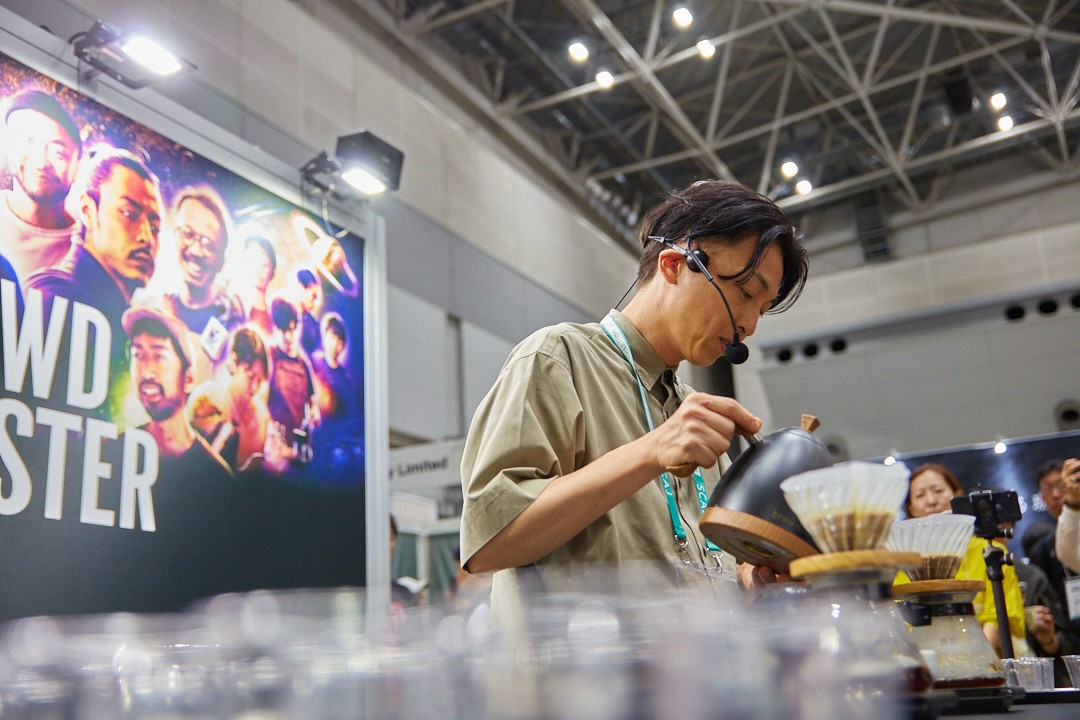
──About the coffee this time, the milk and signature are mainly Finca Milan from Colombia, the espresso is Deborah Geisha from Panama, and you added a little Milan to it. How did you come across the beans for this competition?
Ishitani: I actually went to Panama in April 2023 and did cupping at various farms, and Geisha from Deborah Farm was the coffee I thought was the most delicious. So I asked the producer directly, "I'm going to enter the competition, so I want to use it," and they gave it to me, saying, "If you use it in the competition." The selection method is washed, so I was actually a little worried about how it would be evaluated, as it Shin the opposite of the recent fermentation process.
But I thought it was delicious, so I decided that I really wanted to use it in espresso. After that, while I was looking for a roaster, I found Milan Farm in Colombia interesting. They are a producer who is working on something difficult called the "culturing process," and they produce an interesting flavor.
So I chose it because I thought it would be interesting to combine something cutting edge with the classic, traditional Geisha .
--How long does it actually take you to select coffee beans from a large selection?
Ishiya: It doesn't take much time to find the right beans. I basically choose from what the roaster has on hand. I don't really say that a particular bean is the best, so it's important to consider who will roast the beans and who I want to work with.
Because coffee beans are a harvest product, we cannot use coffee that is not in season, so we select coffee that is in good condition at the time of the tournament.
--Because you work individually under the name TAKA ISHITANI, it must be important for you to work with a reliable roaster.
Ishiya: Yes, I really trust the roasters and leave it to them. Of course, I give them feedback after tasting it, like "I could do it a little bit more this way," but they respond with, "I tried roasting it like this next time," so I trust them in that respect.
──The vibrant flavor of the signature beverage was particularly impressive for this coffee. Although it is based on espresso, you have added a variety of drinks. I think it is quite difficult to convey the taste in words, but I felt that this is exactly what Mr. Ishitani meant when he said at the beginning: "New possibilities for coffee."
Ishitani: That's right. First of all, you can't create this kind of taste unless the coffee has a strong individuality. Of course, I think there are many delicious dark roasted coffees, but if that's all you have, the taste will end up being similar, and the individuality will disappear.
Making a signature beverage is similar to making a cocktail. The point is that I can now use a variety of things with coffee as one of the ingredients. So I ask bartenders about various things and get hints every day and combine them to make my signature beverage. It's just like making a cocktail.
Ishitani: I actually went to Panama in April 2023 and did cupping at various farms, and Geisha from Deborah Farm was the coffee I thought was the most delicious. So I asked the producer directly, "I'm going to enter the competition, so I want to use it," and they gave it to me, saying, "If you use it in the competition." The selection method is washed, so I was actually a little worried about how it would be evaluated, as it Shin the opposite of the recent fermentation process.
But I thought it was delicious, so I decided that I really wanted to use it in espresso. After that, while I was looking for a roaster, I found Milan Farm in Colombia interesting. They are a producer who is working on something difficult called the "culturing process," and they produce an interesting flavor.
So I chose it because I thought it would be interesting to combine something cutting edge with the classic, traditional Geisha .
--How long does it actually take you to select coffee beans from a large selection?
Ishiya: It doesn't take much time to find the right beans. I basically choose from what the roaster has on hand. I don't really say that a particular bean is the best, so it's important to consider who will roast the beans and who I want to work with.
Because coffee beans are a harvest product, we cannot use coffee that is not in season, so we select coffee that is in good condition at the time of the tournament.
--Because you work individually under the name TAKA ISHITANI, it must be important for you to work with a reliable roaster.
Ishiya: Yes, I really trust the roasters and leave it to them. Of course, I give them feedback after tasting it, like "I could do it a little bit more this way," but they respond with, "I tried roasting it like this next time," so I trust them in that respect.
──The vibrant flavor of the signature beverage was particularly impressive for this coffee. Although it is based on espresso, you have added a variety of drinks. I think it is quite difficult to convey the taste in words, but I felt that this is exactly what Mr. Ishitani meant when he said at the beginning: "New possibilities for coffee."
Ishitani: That's right. First of all, you can't create this kind of taste unless the coffee has a strong individuality. Of course, I think there are many delicious dark roasted coffees, but if that's all you have, the taste will end up being similar, and the individuality will disappear.
Making a signature beverage is similar to making a cocktail. The point is that I can now use a variety of things with coffee as one of the ingredients. So I ask bartenders about various things and get hints every day and combine them to make my signature beverage. It's just like making a cocktail.
The hidden theme is "being close to the customer"
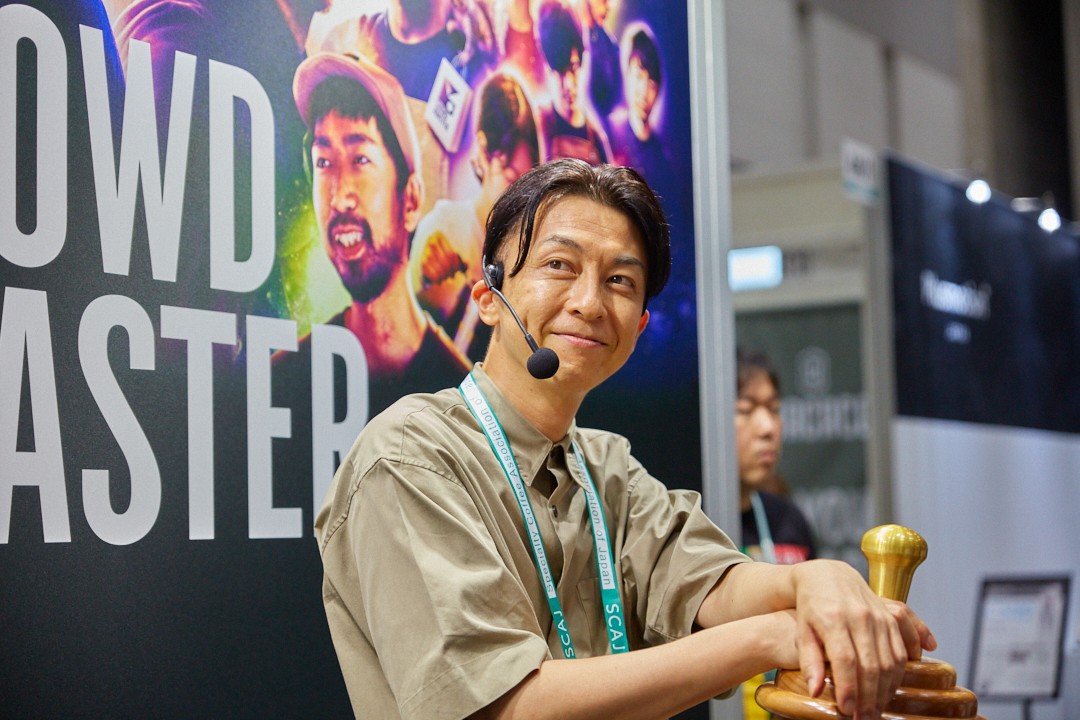
--So the theme that connects milk, signature, and espresso, which seem to have no connection at all, is "making ideals a reality."
Ishitani: That's right. On top of that, we made it a priority to be close to the customer during the final espresso.
Extracting Geisha is very difficult and often ends up being inconsistent. Fermented coffee has a very strong aroma and people are surprised when they drink it, but a clean washed coffee like Geisha is hard to convey its goodness. People who know a lot about it think, "This kind of washed coffee is really delicious," but those who don't probably think it's "sour" or "weak." That's a waste.
However, adding a little Milan makes the flavor easier to understand, so it's easier to communicate to customers. The final ideal is to be close to the customer and share the coffee. That was the underlying theme.
However, I had to condense my presentation during the competition, so I wasn't able to talk about that much.
However, I wanted to convey the excitement of specialty coffee, and the fact that SCAJ is celebrating its 20th anniversary and that what I had always dreamed of is now becoming a reality.
--There was actually a lot of thought put into adding just a little bit of Milan, which was used at the beginning.
Ishitani: That's right. If you add a different coffee other than Milan, the consistency will probably disappear.
Also, I'm not sure how much of this was conveyed to the judges, but I was hoping they could understand the technical aspects of controlling the fact that every coffee bean is slightly different.
It's not easy to make all the coffees using the same coffee and the same grind, but this time the beans are all different, and the grinder's diamond ring, mesh, and recipe have all been changed.
Ishitani: That's right. On top of that, we made it a priority to be close to the customer during the final espresso.
Extracting Geisha is very difficult and often ends up being inconsistent. Fermented coffee has a very strong aroma and people are surprised when they drink it, but a clean washed coffee like Geisha is hard to convey its goodness. People who know a lot about it think, "This kind of washed coffee is really delicious," but those who don't probably think it's "sour" or "weak." That's a waste.
However, adding a little Milan makes the flavor easier to understand, so it's easier to communicate to customers. The final ideal is to be close to the customer and share the coffee. That was the underlying theme.
However, I had to condense my presentation during the competition, so I wasn't able to talk about that much.
However, I wanted to convey the excitement of specialty coffee, and the fact that SCAJ is celebrating its 20th anniversary and that what I had always dreamed of is now becoming a reality.
--There was actually a lot of thought put into adding just a little bit of Milan, which was used at the beginning.
Ishitani: That's right. If you add a different coffee other than Milan, the consistency will probably disappear.
Also, I'm not sure how much of this was conveyed to the judges, but I was hoping they could understand the technical aspects of controlling the fact that every coffee bean is slightly different.
It's not easy to make all the coffees using the same coffee and the same grind, but this time the beans are all different, and the grinder's diamond ring, mesh, and recipe have all been changed.
The World Championships are an opportunity to Manabu things you don't know yet.
──Finally, please tell us about your enthusiasm for the World Baseball Classic (WBC) to be held in Korea.
Ishiya: The efforts leading up to the last world championships were a time when I was able to absorb a lot of things I didn't know. When I think that I'll be able to do it again in six months, I'm really looking forward to it. I'm really looking forward to what I can still absorb and discover new things I don't know.
And of course, I want to get a good result this time. Last time, I achieved my goal of just making it to the finals, so I want to do my best to win.
--What are you thinking about in order to become number one in the world?
Ishiya: Even though I'm aiming to win, competitions are still a lot of fun. Rather than working to win, I want to have 15 minutes where I can have fun expressing things I don't know yet. The competition has just ended, and I haven't decided what I'll do in the next competition yet, so that's the stage I'm at right now.
--The world championships will be held in May 2024, but will the coffee beans used this time not be used or will there be a presentation?
Ishitani: Over the course of six months, the condition of the coffee will change, and new beans will come in, so we will of course have to think about what to use. We will be working on this while also thinking about what kind of presentation we will give to the world and the schedule.
──I'm looking forward to the World Championships. Thank you, Ishitani-san. And congratulations!
Ishiya: The efforts leading up to the last world championships were a time when I was able to absorb a lot of things I didn't know. When I think that I'll be able to do it again in six months, I'm really looking forward to it. I'm really looking forward to what I can still absorb and discover new things I don't know.
And of course, I want to get a good result this time. Last time, I achieved my goal of just making it to the finals, so I want to do my best to win.
--What are you thinking about in order to become number one in the world?
Ishiya: Even though I'm aiming to win, competitions are still a lot of fun. Rather than working to win, I want to have 15 minutes where I can have fun expressing things I don't know yet. The competition has just ended, and I haven't decided what I'll do in the next competition yet, so that's the stage I'm at right now.
--The world championships will be held in May 2024, but will the coffee beans used this time not be used or will there be a presentation?
Ishitani: Over the course of six months, the condition of the coffee will change, and new beans will come in, so we will of course have to think about what to use. We will be working on this while also thinking about what kind of presentation we will give to the world and the schedule.
──I'm looking forward to the World Championships. Thank you, Ishitani-san. And congratulations!
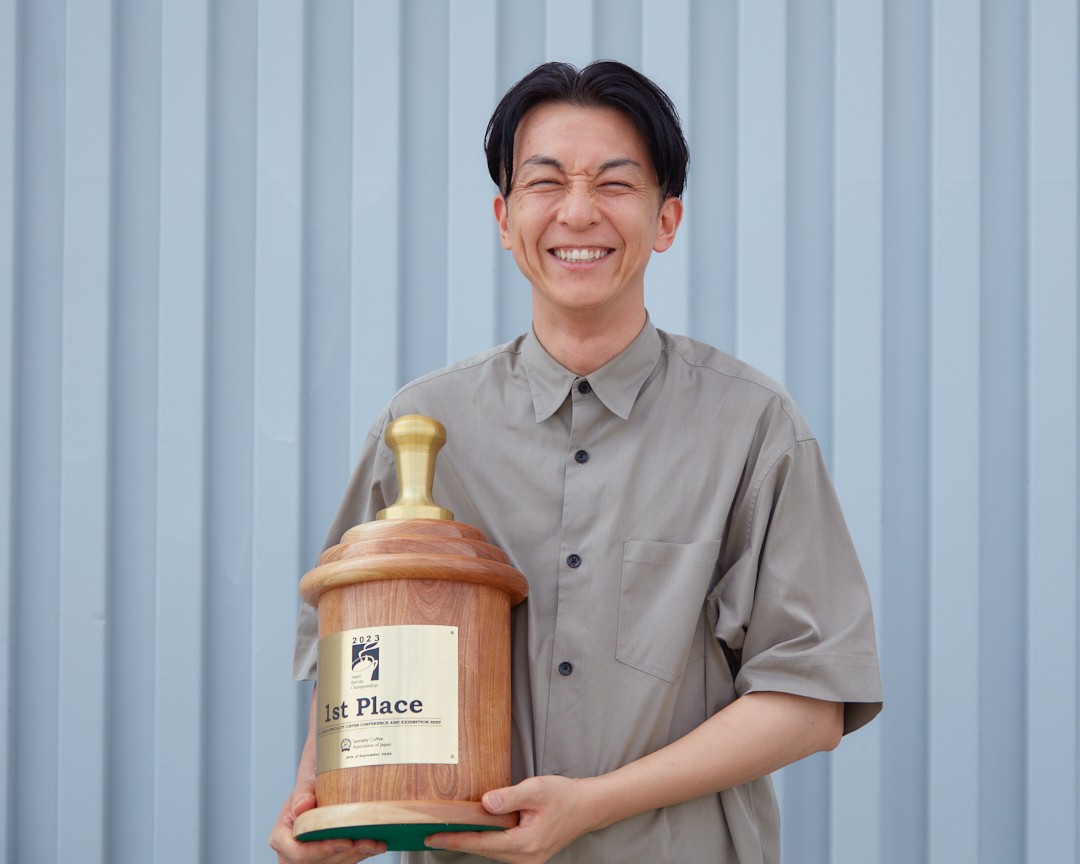
At SCAJ2023, the day after the JBC finals, we held a talk and brewing event with Ishii Yasuo from LEAVES COFFEE at the CROWD ROASTER booth.
You can watch the event in the archived broadcast below!
Please take a look.
2023.10.14
CROWD ROASTER

